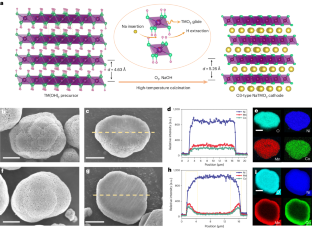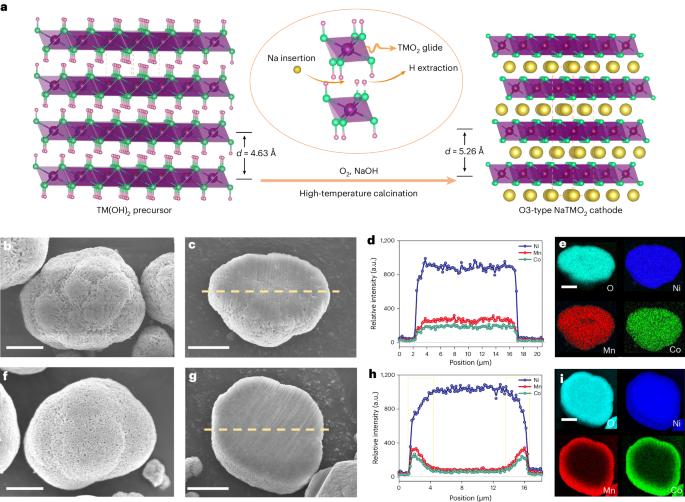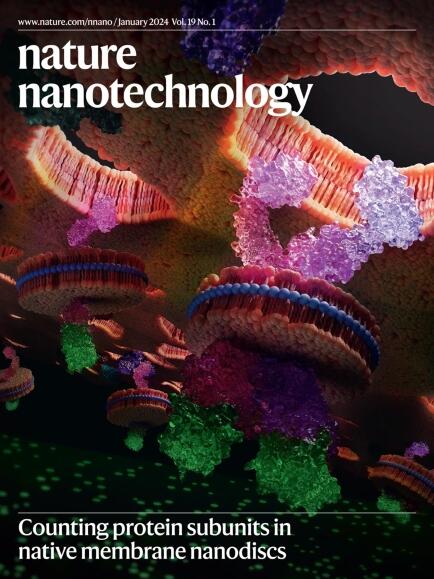实现无缺陷层状过渡金属氧化物阴极的微应变筛选
IF 38.1
1区 材料科学
Q1 MATERIALS SCIENCE, MULTIDISCIPLINARY
引用次数: 0
摘要
众所周知,微应变和与之相关的结构缺陷由表及里的传播是开发高能量和长寿命电池的主要障碍。然而,电池材料合成过程中微应变的起源和影响在很大程度上仍不为人所知。在此,我们在钠层状氧化物阴极的实时和现实合成过程中进行了微应变筛选。从多尺度原位同步辐射 X 射线衍射和显微镜表征中收集的证据共同揭示出,过渡金属在单个前驱体颗粒中的空间分布在很大程度上制约着合成过程中的纳米级相变、局部电荷异质性和微应变累积。过渡金属出乎意料地占据主导地位,导致缺陷成核和生长出现反直觉的向外传播。这些洞察力指引了一条更合理的合成路线,以减少体格内的微应变和晶体学缺陷,从而显著提高结构稳定性。目前关于微应变筛选的研究工作代表着向通过设计合成无缺陷电池材料迈出的关键一步。本文章由计算机程序翻译,如有差异,请以英文原文为准。


Microstrain screening towards defect-less layered transition metal oxide cathodes
Microstrain and the associated surface-to-bulk propagation of structural defects are known to be major roadblocks to developing high-energy and long-life batteries. However, the origin and effects of microstrain during the synthesis of battery materials remain largely unknown. Here we perform microstrain screening during real-time and realistic synthesis of sodium layered oxide cathodes. Evidence gathered from multiscale in situ synchrotron X-ray diffraction and microscopy characterization collectively reveals that the spatial distribution of transition metals within individual precursor particles strongly governs the nanoscale phase transformation, local charge heterogeneity and accumulation of microstrain during synthesis. This unexpected dominance of transition metals results in a counterintuitive outward propagation of defect nucleation and growth. These insights direct a more rational synthesis route to reduce the microstrain and crystallographic defects within the bulk lattice, leading to significantly improved structural stability. The present work on microstrain screening represents a critical step towards synthesis-by-design of defect-less battery materials. In situ synchrotron X-ray tools are used to perform microstrain screening during solid-state synthesis of battery materials, leading to fewer structural defects and improved performance.
求助全文
通过发布文献求助,成功后即可免费获取论文全文。
去求助
来源期刊

Nature nanotechnology
工程技术-材料科学:综合
CiteScore
59.70
自引率
0.80%
发文量
196
审稿时长
4-8 weeks
期刊介绍:
Nature Nanotechnology is a prestigious journal that publishes high-quality papers in various areas of nanoscience and nanotechnology. The journal focuses on the design, characterization, and production of structures, devices, and systems that manipulate and control materials at atomic, molecular, and macromolecular scales. It encompasses both bottom-up and top-down approaches, as well as their combinations.
Furthermore, Nature Nanotechnology fosters the exchange of ideas among researchers from diverse disciplines such as chemistry, physics, material science, biomedical research, engineering, and more. It promotes collaboration at the forefront of this multidisciplinary field. The journal covers a wide range of topics, from fundamental research in physics, chemistry, and biology, including computational work and simulations, to the development of innovative devices and technologies for various industrial sectors such as information technology, medicine, manufacturing, high-performance materials, energy, and environmental technologies. It includes coverage of organic, inorganic, and hybrid materials.
 求助内容:
求助内容: 应助结果提醒方式:
应助结果提醒方式:


